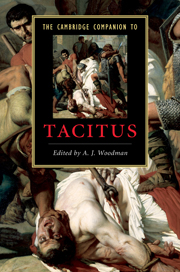Book contents
- Frontmatter
- Introduction
- Part I Contexts
- Part II Texts
- 3 The Agricola
- 4 The Germania as literary text
- 5 The faces of eloquence: the Dialogus de oratoribus
- 6 Fission and fusion: shifting Roman identities in the Histories
- 7 The Tiberian hexad
- 8 Hamlet without the prince? The Claudian Annals
- 9 ‘Is dying so very terrible?’ The Neronian Annals
- Part III Topics
- Part IV Transmission
- Chronological table
- Abbreviations and bibliography
- Index
7 - The Tiberian hexad
from Part II - Texts
Published online by Cambridge University Press: 28 March 2010
- Frontmatter
- Introduction
- Part I Contexts
- Part II Texts
- 3 The Agricola
- 4 The Germania as literary text
- 5 The faces of eloquence: the Dialogus de oratoribus
- 6 Fission and fusion: shifting Roman identities in the Histories
- 7 The Tiberian hexad
- 8 Hamlet without the prince? The Claudian Annals
- 9 ‘Is dying so very terrible?’ The Neronian Annals
- Part III Topics
- Part IV Transmission
- Chronological table
- Abbreviations and bibliography
- Index
Summary
“Tacitus had provocatively opened the Annals with Augustus' death.” / In undertaking his history Ab excessu Diui Augusti - now commonly known as Annals - Tacitus faced the problem of where and how to begin. The earlier Histories open with the consuls of 69, and much has been written on the importance of this timing for Tacitus' historiographical aims. In particular, electing to start not with the death of Nero but with the magistrate year establishes a thematic dissonance between the forthcoming narrative of the principates of Galba through Domitian and the traditional means of recording Roman history, which was structured by annual consular dating. But the choice of annalistic format did not oblige Tacitus to begin with 1 January: previous annalistic history had accommodated the different calendars of the Republican year, and events could easily take precedence over the calendar. So Livy elects to use the sack of Rome by the Gauls as the dividing point between his Books 5 and 6; and, though the move from monarchy to Republic is marked by the establishment of consular elections (1.60.3; 2.1.7), he is interested more in the process of change than in the time of year, more in the annual nature of the offices than in any particular annus or part thereof.
- Type
- Chapter
- Information
- The Cambridge Companion to Tacitus , pp. 100 - 115Publisher: Cambridge University PressPrint publication year: 2010
- 2
- Cited by

